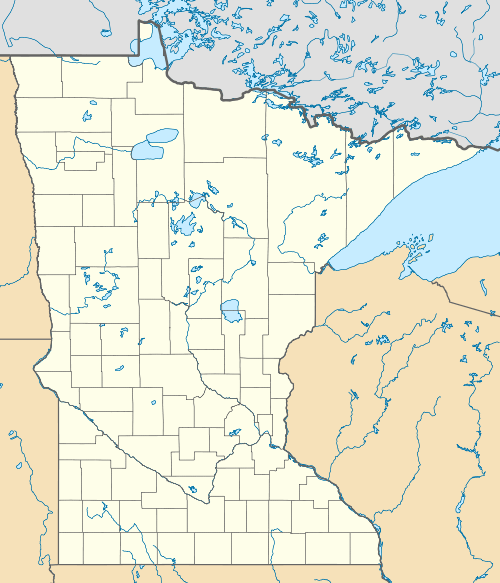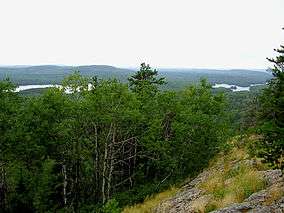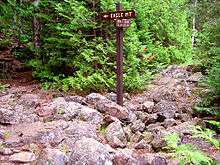Eagle Mountain (Minnesota)
| Eagle Mountain | |
|---|---|
|
The 2,301-foot Eagle Mountain, seen across Whale Lake. July 2014. | |
| Highest point | |
| Elevation | 2,301 ft (701 m) NGVD 29[1] |
| Prominence | 1,321 ft (403 m) [1] |
| Listing | U.S. state high point 37th |
| Coordinates | 47°53′51″N 90°33′36″W / 47.8973909°N 90.5601105°WCoordinates: 47°53′51″N 90°33′36″W / 47.8973909°N 90.5601105°W [2] |
| Geography | |
 Eagle Mountain | |
| Parent range | Misquah Hills |
| Topo map | USGS Eagle Mountain |
| Climbing | |
| Easiest route | Maintained hiking trail |
Eagle Mountain is the highest natural point in Minnesota, at 2,301 feet (701 m). It is located in northern Cook County and is in the Boundary Waters Canoe Area Wilderness and Superior National Forest in the Misquah Hills, northwest of the community of Grand Marais. It is a Minnesota State Historic Site.[3]
Eagle Mountain is only about 15 miles (24 km) from Minnesota's lowest elevation, Lake Superior, at 600 feet (183 m).[4] It is part of the Canadian Shield. Confusingly, there is another, much shorter, peak named Eagle Mountain in northern Minnesota. The shorter peak is part of the Lutsen Mountains ski resort.
The hike to the summit can be made in about two and a half hours. The distance to the peak is about 3.5 miles (5.6 km) with an elevation gain of 550 feet (168 m). The trail is rocky and moderately strenuous. Whale Lake is located about halfway along the trail and offers two campsites to hikers. The peak of the mountain is marked with a plaque.
Permits are required because portions of this hike enter the Boundary Waters Canoe Area Wilderness. Self-issued permits are available at any Superior National Forest ranger station or at the trailhead. Instructions and the permit can usually be found at the trailhead kiosk.[5]
On the list of highest natural points (highpoints) in each U.S. state, Eagle Mountain ranks 37th.[6]
 View from near the top of Eagle Mountain.
View from near the top of Eagle Mountain. The rugged Eagle Mountain Trail at its junction with the trail to Brule Lake.
The rugged Eagle Mountain Trail at its junction with the trail to Brule Lake. April hike to Eagle Mountain
April hike to Eagle Mountain Plaque marking the peak of Eagle Mountain
Plaque marking the peak of Eagle Mountain
See also
| Wikimedia Commons has media related to Eagle Mountain, Minnesota. |
References
- 1 2 "Eagle Mountain, Minnesota". Peakbagger.com. Retrieved 2011-05-14.
- ↑ "Eagle Mountain". Geographic Names Information System. United States Geological Survey. Retrieved 2011-05-14.
- ↑ "Minnesota Statute § 138.57, subd. 3". Minnesota Revisor of Statutes. Retrieved 2007-02-26.
- ↑ "Great Lakes Atlas: Factsheet #1". United States Environmental Protection Agency. April 11, 2011. Retrieved 2013-06-06.
- ↑ "Eagle Mountain Trail". USDA Forest Service. Retrieved 2014-02-16.
- ↑ "Map and List of U.S. State Highpoints". The Peak Seeker. Retrieved 2016-02-16.
External links
- Eagle Mt/Brule Lake, U.S. Forest Service. Map and access information.
- "Eagle Mountain". SummitPost.org. Retrieved 2012-11-08.
- "U.S. State Highpoints". SummitPost.org. Retrieved 2011-05-14.
